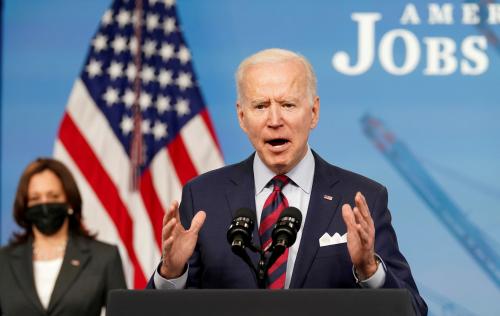Below is a viewpoint from the USMCA Forward 2022 report, which examines key priorities to build a more competitive, inclusive, and sustainable North American economy.
 The American Federation of Labor and Congress of Industrial Organizations (AFL-CIO) advocates every day for a global economy that benefits working people in every country, safeguards a livable planet, and bolsters democracy. But this isn’t possible without a fairer global trade model. Signed into law on Jan. 29, 2020, the United States–Mexico–Canada Agreement (USMCA) is such a model, and the first major trade agreement the AFL-CIO has supported in nearly 20 years.
The American Federation of Labor and Congress of Industrial Organizations (AFL-CIO) advocates every day for a global economy that benefits working people in every country, safeguards a livable planet, and bolsters democracy. But this isn’t possible without a fairer global trade model. Signed into law on Jan. 29, 2020, the United States–Mexico–Canada Agreement (USMCA) is such a model, and the first major trade agreement the AFL-CIO has supported in nearly 20 years.
As president of the AFL-CIO, I am often asked how we came to support the USMCA after opposing the original North American Free Trade Agreement (NAFTA) and many subsequent trade deals.
To simplify it, NAFTA was written without real input from working people or their unions. Consequently, labor standards were relegated to an unenforceable side agreement. The USMCA, on the other hand, contains strong and enforceable labor provisions—the result of a sustained, authentic dialogue we helped shape.
Critically, as a precondition for the agreement, the USMCA required Mexico to adopt a package of labor law reforms designed to strengthen workers’ virtually nonexistent rights to organize independent trade unions and bargain collectively. Together, these reforms seek to address Mexico’s corrupt system of “protection contracts,” where employers sign bogus collective bargaining agreements with illegitimate, undemocratic trade unions that serve the companies’ interests. Over the past several decades, the protection contract system has played a fundamental role in keeping Mexican workers’ wages artificially low, encouraging offshoring of jobs from the United States and dragging down wages and standards across North America.
[The USMCA] represents a major improvement over NAFTA and points the way toward a more balanced, worker-centered trade model capable of delivering broad-based economic growth that advances workers’ rights.
Given the real-life harm the protection contract system has caused workers across borders, the USMCA contains a new rapid-response enforcement mechanism that allows the U.S. government to bring trade enforcement cases directly against private employers in Mexico accused of denying workers their fundamental human rights of freedom of association and collective bargaining. Under the new mechanism, Mexican facilities found to be violating workers’ rights must take effective corrective actions or face significant financial penalties, including, for repeat offenders, potential loss of access to the U.S. market. The Biden–Harris administration already has used the mechanism twice, resulting in rapid settlements that advanced workers’ rights.
The USMCA raised the bar on other important labor standards as well. For example, it requires all three countries to adopt and implement bans on the import of goods made with forced labor. In addition, it contains strong rules of origin, particularly in the auto sector, which will require companies to use more North American content in order to qualify for tariff reductions under the agreement. All of these commitments are backed up by an array of monitoring and enforcement mechanisms to ensure all trade partners live up to the terms of the deal.
More broadly, the USMCA eliminated various special interest giveaways to multinational corporations, including excessive patent protections that would have made prescription drugs even more expensive for North American workers. In addition, it greatly restricts access to investor-state dispute settlement (ISDS), which corporations have used to challenge basic environmental, public health, and labor protections in all three countries.
Despite these advances, the USMCA is far from perfect. By itself, it will not end outsourcing, growing economic inequality or climate change. However, it represents a major improvement over NAFTA and points the way toward a more balanced, worker-centered trade model capable of delivering broad-based economic growth that advances workers’ rights.







Commentary
The USMCA and the way forward for trade policy
February 28, 2022